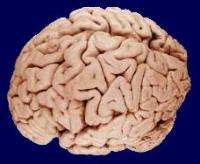Brain booster for bipolar disorder

(Medical Xpress)—Providing the brain with an energy boost could be a new way to treat bipolar depression.
Deakin University's IMPACT Strategic Research Centre, in partnership with Barwon Health, is undertaking a world-first trial combining a drug used to treat paracetamol overdose with nutraceuticals as a potential new treatment for bipolar depression.
Bipolar disorder affects functioning of the brain, causing people to experience extreme high (mania) or low (depression) moods. People with bipolar disorder spend three times longer in the depressive phase than in the manic phase, and existing treatments often do not lead to full recovery.
"Bipolar disorder seems to be a disorder of energy; too little in depression and too much in mania," said Professor Michael Berk, who is leading the study. "This suggests that if we can usefully target energy, we might help depression in bipolar disorder."
The Geelong scientists are trialing a treatment that involves a compound called N-acetyl cysteine, known as NAC, in combination with other potentially energy-boosting supplements.
NAC has traditionally been used as a treatment for an overdose of paracetamol. It has also previously been found to be beneficial for people with schizophrenia and partially effective for people with clinical depression.
NAC is thought to reduce the effect of underlying physical brain changes that occur in bipolar depression.
"We know that during bipolar depression, changes happen which affect the body's ability to detoxify certain compounds. We also know that mitochondria, the cells' energy producers, don't work in the usual way," Professor Berk said. "The NAC and the combination of supplements that we're trialing work on both of these problems at once, which could lead to quicker recovery."
The researchers are now seeking volunteers for the trial who are over 18 years of age, have a diagnosis of bipolar disorder and are currently experiencing symptoms of depression.
The study requires people to attend seven interviews over the course of the 20-week study. At each visit, a researcher will discuss participant's symptoms and overall experiences while on the study.















